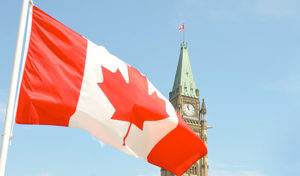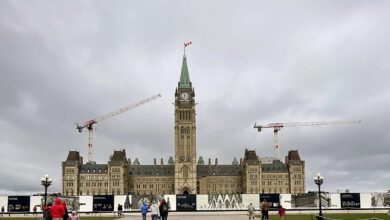
What only a few months ago seemed simple to attain—a majority victory for the Liberal Party—has now been complicated by the combination of several factors that seem to be influencing Canadians’ decisions in this federal election.
The management of the pandemic and a support program for Canadians, with costs never before seen by this country’s economy; the announcement of a support program for families, aimed at transforming daycare into something accessible to all; and other emblematic measures of Justin Trudeau’s government seem not to be enough to overcome the protests by a faction of the population that is outraged by, among other things, what it considers to be an attack on human rights—obligatory vaccines in various sectors of government employment and also the implementation of the Covid Passport which, in practice, prevents the unvaccinated from leading a “normal” life.
On September 20th, we will find out which party will lead Canada during the next mandate, and we’ll understand what kind of government can be formed–with or without an absolute majority.
With the elections at our doorstep, Milénio Stadium had the opportunity to speak with Dr. Mike Medeiros, a political scientist who is a specialist in Canadian/Quebec politics. He has been a regular contributor in the news media in the analyses of political developments in Canada. Dr. Mike Medeiros’ research focuses on sociopolitical issues related to ethnicity, gender, elections and nationalism.
Milénio Stadium: A majority government may be out of reach for both the Liberal and Conservative parties. What potential minority government scenarios Canada could be facing?
Mike Medeiros: There is still a week to go, and a lot could still change during that time. However, if we do not see a party averaging between 35-37% in the polls by this weekend, it will indeed be unlikely that there will be a majority government. There are three minority government scenarios that are possible. The first one is a strong minority government; one that is missing a few seats for a majority and that can count on several parties to support it and its legislation. This was the case of the outgoing Trudeau minority governing that could depend on the votes from either the Bloc Québécois, the NDP, or even the Conservatives (who were in a difficult situation after the election and did not want another one too quickly). The second scenario is of a minority government dependent on one party; which would be the party that finishes in third and that has enough seats to hold the balance of power. In 2006, Stephen Harper was able to become Prime Minister because he was able to obtain the support of the Bloc Québécois, and their 51 MPs. Such a situation becomes like an informal coalition, where the kingmaker party has a great deal of influence on the minority government. The last scenario would be one of a weak minority government in which the support of (at least) two opposition parties would be needed. In such a scenario, either the Liberals or the Conservatives would have to obtain the support of both the NDP and the Bloc Québécois to form a government, and thereafter to pass legislation. The official opposition might also join with the Bloc or the NDP to avoid an election. Such a scenario would be unstable and very difficult for the governing party. Lastly, nothing indicates that there is the chance of a formal coalition forming after the election. This type of scenario is not in Canadian political traditions, and no party seems to want to push for a formal governing coalition.
Also, it is much more likely that the result would be a Liberal government. Due to the concentration of support in Alberta and Saskatchewan, the national polls do not always give a proper indication of which party will win the most seats. The Conservative likely need at least 3-4% more in the national vote total to hope to have more seats than the Liberals. As of today, the polls are indicating that a Liberal government is the likeliest outcome; but there is still a week left, and in politics that is a long time.
MS: Justin Trudeau went to the polls hoping to get four years of a majority government. Do you think that another minority outcome would be a blow to his desire to continue to lead the party?

MM: This is a difficult question to answer. Of course, it will be a tremendous disappointment for the Liberals if they are not able to form a majority government. However, the future of the leader in such a scenario is determined by the desire of the leader to stay on and the existence of potential candidates likely to do better in a future election. While it would be normal for a politician who has been in Parliament for 13 years and PM for 6 years to look to move on from active politics, politics is in Mr. Trudeau’s DNA. Also, in my opinion, I do not believe that there is a natural successor to Mr. Trudeau. We do not have a scenario like the one in which Paul Martin was waiting for Jean Chrétien to leave. While the names of Chrystia Freeland, François-Philippe Champagne, and Mark Carney have been batted around as potential successors, the first two lack the charisma of Mr. Trudeau (as well as his comfort in both official languages) and Mr. Carney lacks political experience. Therefore, if Mr. Trudeau wants to stay on as leader if the Liberals fail to gain enough seats to form a majority government, I doubt that he will be pushed out (as Andrew Scheer was after the last election). Yet, if the Liberals lose power, the pressure would be much stronger for Mr. Trudeau to leave and allow the party to renew itself under new leadership.
MS: If the Liberal Party gets a larger number of seats in Parliament, but not enough for an absolute majority, will the NDP continue to be a determining factor in Canadian political life?
MM: The NDP were not that determining during the last Parliament. The Liberals were only missing 13 seats in 2019 to once again form a majority government. They were in a strong position and only needed the support of a single other party. The Liberals could count on the support of either the Bloc Québécois, the NDP, or the Conservatives (who had leadership issues and were looking to avoid another election).
The NDP has not had a determining influence on government since the 1972-1974 Liberal minority government under Pierre Trudeau. After the 1972 election, the NDP held the balance of power, becoming kingmaker. While the NDP has had some influence on policy throughout the decades, no minority government has depended exclusively on the NDP for support since 1974.
MS: In the lead up to and during this campaign, O’Toole has sought to frame the vote as a choice for Canadians between a left-leaning coalition of parties or the Conservatives. If O’Toole gets a minority victory, what will the balanced power look like? Which parties will the Conservatives be able to count on to support a coalition government?
MM: This messaging seems to have been in part to avoid likely Conservative voters from supporting the Peoples’ Party, the Maverick Party, the Bloc Québécois, or abstain from voting.
If the Conservatives are able to form a minority government, they are most likely to find support from the Bloc Québécois. However, during the second Harper minority government (2008-2011), the Conservatives had enough seats to work with the Bloc, but also the NDP on some occasions; as well as the Liberal party, which was searching for a new leader and unwilling to return quickly into an election. The Conservatives and the Bloc could work very well together on many issues; the Conservatives actually have a distinct platform for Quebec that they describe as a contract with Quebecers. Nevertheless, they will not be able to implement all of their platform promises, as some will not find support with any of the other parties.
Essentially, if the Conservatives are able to form a minority government, we could expect a parliamentary dynamic very similar to the Conservative minority governments under Stephen Harper (2006-2011).
MS: Do you think it possible that Canadians can be faced with another election campaign prior to two years of a minority mandate again? How soon could that happen?
MM: I do not believe that it is very likely that Canadians will be plunged into another election in a few weeks due to the parties not agreeing on a minority government. The tradition in Canada is to find a way to avoid such an outcome and allow for the formation of a minority government. Voters are not likely to be too kind to the party that is perceived as being responsible for failing to form a government.
Minority governments in Canada tend to last 18 to 24 months. While the current criticism targeting the Liberal government for calling an early election might motivate a future minority government to govern until the end of its mandate, the ability to get legislation passed will be, in my opinion, the most determining factor on the duration of the next Parliament. If a government is able to get its legislation passed with the support of other parties, as was the case of the Trudeau minority government, the Parliament might in fact last 4 years.
But past examples advise Canadians that if a minority government is the outcome of next Monday’s (20) election, they should get ready for another election in 18 to 24 months.
MS: In your opinion, what will weigh most heavily on Canadians’ decision of whom to vote for? Will the pandemic be a determining factor in their final choice?
MM: The Liberals would certainly like the election to be a referendum on their management of the pandemic. However, this does not seem to be materialising.
While the pandemic management has been an important campaign issue, so has cost of living, daycare, gun control; as well as, in Quebec, anti-Quebec bias (Quebec bashing) in English Canada.
In my opinion, no specific issue will be dominant. Voters’ decision will be based on more general desires. Therefore, in my opinion, the ballot questions seem to be headed towards: “Do I want Trudeau and the Liberals to continue to govern?” If not, “Do I want the Conservatives to form the next government?”
While based on the polls so far during the campaign, voters have not been enthusiastic about another Trudeau government, certainly not providing the Liberals with the support to form a majority government, they also do not seem ready to hand the reigns of power to the Conservatives. That is why polls are showing that the likeliest outcome is a Liberal minority government.
However, a week is a long time, and something could happen that makes a specific issue dominate the final days of the campaign, potentially even leading voters to change their desired outcome.
MS: Do you expect abstention levels to increase or decrease relative to previous federal elections?
MM: All of the factors are in place for an important decrease in the turnout rate. There is of course the fourth wave of Covid-19 cases. But there are also important limitations to the voting infrastructure. Namely, there is a reduction in polling stations and a decrease in election workers that could lead to longer wait times during in-person voting, which could demotivate electors from going to votes. On-campus voting will also not take place this year, this measure could have an important negative impact on turnout among young voters. Furthermore, this does not seem to be an election campaign in which voters are excited about. In 2015, there was a sense of enthusiasm that was based on a “Trudeaumania” and a desire for change after nine years of Conservative government, this enthusiasm seemingly helps to explain a sizeable increase in turnout compared to 2011. Usually, uninspiring elections have lower turnout.
However, while the 2019 election arguably lacked the enthusiasm of the 2015 one, turnout only decreased by 1%. The more important factors might be related to the pandemic: fear of going to vote in public locations and the added difficulty of casting a ballot. Elections Canada has announced that they sent out less mail-in ballots than they were expecting. While this could be seen as a sign of decreased participation, we will have a better idea of the potential participation rate when Elections Canada announces turnout for advanced polling.
Unless there is an electoral excitement that develops this week and that motivates electors to go vote, we should normally expect, giving all of the particular circumstances, a decrease in turnout.
Yet, there has not been a defining trend regarding turnout in election that have taken place during the pandemic. In Canada, the provincial elections in British Columbia and Saskatchewan saw important declines in turnout, the one in New Brunswick had a slight decline in turnout, whereas the recent election in Nova Scotia actually had an increase in turnout. However, the election in Nova Scotia arguably had a “desire for change” enthusiasm that manifested itself during the final week of the campaign and resulted in a change of governing party, this might have positively impacted voter participation.
Normally, lower turnout rates are believed to negatively affect the Liberals in comparison to the Conservatives. If turnout decreases in an important manner, it might lead to less seats for the Liberals.
Note: this interview was done on Monday, September 13th .
Catarina Balça/MS








Redes Sociais - Comentários